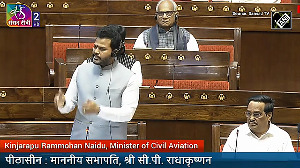Is India, and particularly Bangalore, emerging as a global aerospace engineering hub?
It sure seems like the next generation flights for the leading global aircraft makers could be designed in Bangalore.
On Wednesday, Spirit AeroSystems, the world's largest independent supplier of structures for commercial aircraft teamed up with Infosys Technologies to set up an engineering centre at the Infosys campus in Bangalore.
Spirit AeroSystems builds part of every Boeing commercial aircraft currently in production, except the Boeing 717. Its products include the 737 fuselages, nacelles and pylons, as well as nose sections, for the 747, 767 and 777 aircraft.
Spirit also designs and produces slats, flaps, forward leading edges and trailing edges for 737 wings, slats and floor beams for the 777 airplane, and wing and fuselage components for the 747.
So what is Infosys going to do by setting up an engineering centre for AeroSystems at its Bangalore campus?
The centre, according to Infosys officials, will focus on high-end engineering services including product development, design and analysis of airframe structures, engineering change management and stress engineering support.
In course of time, the engineering centre will grow into a global virtual real-time operation for Spirit AeroSystems.
Infosys is Spirit's first Indian engineering partner that will provide access to global engineering talent, reduce time-to-market by enabling rapid design and deployment and offering efficient global support across clients, enhance Spirit's scalability and flexibility to take up multiple aircraft programmes for global customers.
Commenting on the partnership, Kris Gopalakrishnan, COO and deputy managing director, Infosys Technologies Ltd, said: "Our partnership with Spirit AeroSystems is a validation of India increasingly being looked at as a global engineering hub."
"We see the partnership as playing a key role in Infosys' focus on the aerospace industry. The engineering centre will challenge Infoscions to apply their skills to cutting-edge global aerospace programs to provide world-class solutions," he said.
The hi-tech aerospace project for Infosys, coupled with other global engineering projects in airline industry, is turning Bangalore and India into an engineering hub as well.
It is not just Infosys alone that is taking up prestigious aerospace projects.
Last year, the Indian Institute of Science, India's most prestigious science research institute, joined hands with Boeing, the leading American manufacturer of satellites, commercial jetliners and military aircraft, to work on nine unique projects to build the next generation flights.
Involved in the massive project are nearly 40 researchers at the IISc.
It is for the first time that such an extraordinary project is being handled by an Indian institute. The project is managed by the Society for Innovation and Development (SID), that the IISc founded more than a decade back as its commercial arm.
SID undertakes research and development projects based on individual or joint proposals from the faculty and scientists of IISc in collaboration with industries, business establishments, and national and international organisations.
Boeing's other global partners in research include Carnegie Mellon, Stanford Engineering, Massachusetts Institute of Technology, Caltech, University of Illinois at Urbana Champaign, and University of Cambridge.
As per the IISc-Boeing tie-up, the aerospace major would invest $5 million in research every year for the next few years in the company's aircraft projects with the institute.
To build these new flights, the IISc team has proposed the use of smart structures, application of lightweight materials such as nano materials, alloys and their composites.
IISc's areas of focus right now include developing flaps for the aircraft that are fitted with smart sensors so that they can direct wind currents better, use of aluminium alloys in high temperature areas as well as in landing gear boxes.
The aircraft designs will be tested in a virtual environment that is being developed at the IISc. Nearly 40 faculty members from various IISc departments such as aerospace, metallurgy, centre for product design and manufacturing, and civil engineering are involved in the Boeing project.
Sensing that India is turning into a global engineering hub, for cutting-edge projects including aerospace, the National Association of Software and Services Companies has already initiated the Engineering Services Forum.
The Nasscom task: To build a brand for India as the outsourcing destination for engineering services.
A recent Nasscom study said the market potential for outsourced engineering services was in the range of $7 billion to $12 billion, while the value of work currently undertaken by India-based vendors in this space was estimated about $500 million.





